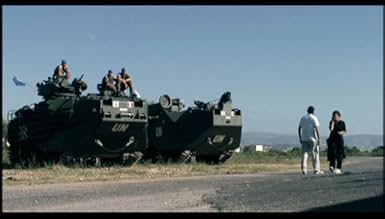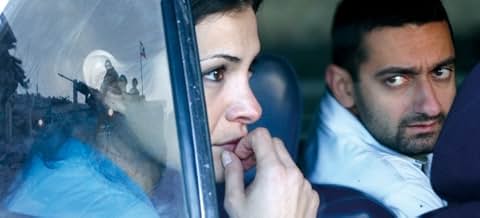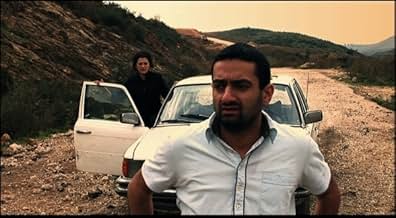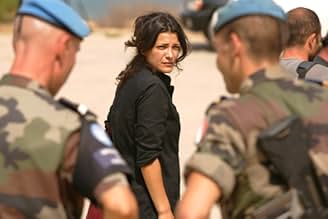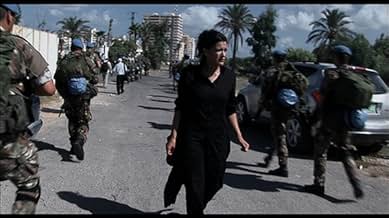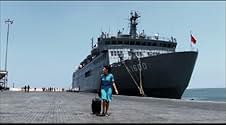VALUTAZIONE IMDb
7,0/10
1792
LA TUA VALUTAZIONE
Aggiungi una trama nella tua linguaIn the wake of Israel's 2006 bombardment of Lebanon, a determined woman finds her way into the country convincing a taxi cab driver to take a risky journey around the scarred region in searc... Leggi tuttoIn the wake of Israel's 2006 bombardment of Lebanon, a determined woman finds her way into the country convincing a taxi cab driver to take a risky journey around the scarred region in search of her sister and her son.In the wake of Israel's 2006 bombardment of Lebanon, a determined woman finds her way into the country convincing a taxi cab driver to take a risky journey around the scarred region in search of her sister and her son.
- Regia
- Sceneggiatura
- Star
- Premi
- 8 vittorie e 4 candidature totali
Recensioni in evidenza
This is a really good film. And due to the fact that it was shot during the actual crisis gives it a documentary feel. Complimented with that is the superb acting of the lead characters. It's like real life unfolding on screen - the rampant destruction, needless pains & senseless atrocities of the war. The rustic music also suits the storyline perfectly.
A couple sequences though didn't quite fit into the flow of the story: - the sex scene seemed unnecessary and the breaking down of the car at the very end seemed like a little forced upon melodrama.
Would recommend this movie to anyone who is in a mood to find out how the Middle East politico-religious crisis affects a common citizen.
A couple sequences though didn't quite fit into the flow of the story: - the sex scene seemed unnecessary and the breaking down of the car at the very end seemed like a little forced upon melodrama.
Would recommend this movie to anyone who is in a mood to find out how the Middle East politico-religious crisis affects a common citizen.
Director Aractingi shot this film in the immediate wake of the systematic 34-day Israeli bombing of Lebanon in summer 2006, which left much of the country devastated, especially the South. He uses his own footage of the bombing itself, which shows whole neighborhoods being decimated, and then shoots among the rubble to tell the story of Zaina (Nada Abou Farhat), a divorced mother who comes from Dubai, where she was living with her architect husband, to find Karim, her six-year-old son, who was trapped by the bombing in Kherbet Salam, a Shia Muslim village in southern Lebanon. Zaina left Karim there with her sister, ironically, to "protect" him from the stress of her divorce. The only taxi driver who'll make the dangerous trip is Tony (George Khabbaz), a Christian who turns out to be from the South himself.
Aractingi got the idea of shooting in war devastation with an improvised plot in 1989 as Lebanon's civil war of that time wound down, but fear prevented him from proceeding. Instead he shot 40 documentaries and one feature that used improvisation (the 2005 Bosta) and also starred Nada Abou Farhat. As he got to work with his cast and crew for Under the Bombs, beginning shooting during the bombing and continuing during the ceasefire, he made the decision not to deal with the war so much as its impact on innocent victims, which Zaina and Karim obviously are.
And many of the people and their sufferings are authentic and real-time. When Tony and Zaina reach Kherbet Salam the building her sister lived in is completely destroyed. A young woman comes up and tells her Maha, her sister, is a martyr now. Zaina and Tony go to witness the disinterring of those who died to be reburied in "martyrs' graves," hoping to find the body of Maha (they do not). Aractingi films the actual funerals--not an easy task.
People say Karim was taken up by foreign journalists and went away with them, and this leads Tony and Zaina further south, just a few kilometers from the Israeli border, where they stop over with Tony's Christian family. It emerges that they were collaborators during the long Israeli occupation of south Lebanon and one brother is among those who fled to live in Israel in the aftermath of that time. The confrontation between Tony and his relatives over this collaboration is the fruit of discussions among villagers which Aractingi and his co-writer, Michel Léviant, condensed into a script. This is one example of how the actual fed into the fictional in the day-to-day shooting.
The emotions are powerful and the backgrounds are horrifying in the film. Nothing quite equals the sense of identification when Zaina looks at a whole street where her sister lived and finds only ruins after the systematic bombing destruction. Less successful at times are the interactions between Zaina and Tony, who flirts, comforts, and acts out a surprisingly graphic sex scene with a room clerk at a hotel they stop at on the way. Khabbaz and Abou Farhat are good, but some cutting might have helped eliminate distracting elements. The car's breaking down just before the couple gets to the monastery where Karim is rumored to be seems a rather obvious suspense device too.
The film is neutral as it can be, perhaps to a fault. One wonders why Hezbollah is barely even mentioned, since it is the other party in the warfare, and was the prime provider of aid to the victims in the bombing's immediate aftermath. Though the collaborating family members refer to being "forced to work for the Devil," meaning Israel, the focus is on the suffering rather than its source. Aractingi's film has flaws, but its boldness in bringing to the screen the 2006 bombing of Lebanon and the civilian suffering it caused can't be faulted.
The San Francisco International Film Festival 2008 provided the West Coast premiere of this film, which was scheduled to open less than two weeks later, on May 12, in Paris. This was nominated for the Grand Jury prize at Sundance and received the EIUC Award at Venice.
Aractingi got the idea of shooting in war devastation with an improvised plot in 1989 as Lebanon's civil war of that time wound down, but fear prevented him from proceeding. Instead he shot 40 documentaries and one feature that used improvisation (the 2005 Bosta) and also starred Nada Abou Farhat. As he got to work with his cast and crew for Under the Bombs, beginning shooting during the bombing and continuing during the ceasefire, he made the decision not to deal with the war so much as its impact on innocent victims, which Zaina and Karim obviously are.
And many of the people and their sufferings are authentic and real-time. When Tony and Zaina reach Kherbet Salam the building her sister lived in is completely destroyed. A young woman comes up and tells her Maha, her sister, is a martyr now. Zaina and Tony go to witness the disinterring of those who died to be reburied in "martyrs' graves," hoping to find the body of Maha (they do not). Aractingi films the actual funerals--not an easy task.
People say Karim was taken up by foreign journalists and went away with them, and this leads Tony and Zaina further south, just a few kilometers from the Israeli border, where they stop over with Tony's Christian family. It emerges that they were collaborators during the long Israeli occupation of south Lebanon and one brother is among those who fled to live in Israel in the aftermath of that time. The confrontation between Tony and his relatives over this collaboration is the fruit of discussions among villagers which Aractingi and his co-writer, Michel Léviant, condensed into a script. This is one example of how the actual fed into the fictional in the day-to-day shooting.
The emotions are powerful and the backgrounds are horrifying in the film. Nothing quite equals the sense of identification when Zaina looks at a whole street where her sister lived and finds only ruins after the systematic bombing destruction. Less successful at times are the interactions between Zaina and Tony, who flirts, comforts, and acts out a surprisingly graphic sex scene with a room clerk at a hotel they stop at on the way. Khabbaz and Abou Farhat are good, but some cutting might have helped eliminate distracting elements. The car's breaking down just before the couple gets to the monastery where Karim is rumored to be seems a rather obvious suspense device too.
The film is neutral as it can be, perhaps to a fault. One wonders why Hezbollah is barely even mentioned, since it is the other party in the warfare, and was the prime provider of aid to the victims in the bombing's immediate aftermath. Though the collaborating family members refer to being "forced to work for the Devil," meaning Israel, the focus is on the suffering rather than its source. Aractingi's film has flaws, but its boldness in bringing to the screen the 2006 bombing of Lebanon and the civilian suffering it caused can't be faulted.
The San Francisco International Film Festival 2008 provided the West Coast premiere of this film, which was scheduled to open less than two weeks later, on May 12, in Paris. This was nominated for the Grand Jury prize at Sundance and received the EIUC Award at Venice.
Under the Bombs (2007)
I can picture this being required viewing for anyone wanting a view of the kind of back and forth fighting between Israel and its many unfriendly neighbors. The devastation from superior Israeli firepower is horrifying. And you can see better the anger that ordinary Lebanese citizens--Muslim and Christian both--have toward the apparently insensitive Israelis.
The way this is unfolded is a convergence of two kinds of victims of the violence--a mother looking for her child and a taxi driver who she hires to take her around. In the searching we see all of Southern Lebanon's worst destruction--the real thing, shot on site--and we feel the frustration and hatred in all the people at the situation. We also see that it comes down to coping, as well, with a sense of resignation, that it's all out of their reach, even if the bombs reach them all too easily.
So, you'll cry and be in ruins yourself if you let yourself be absorbed. There is eventually going to be a sense that the movie plays the same chords for too long. The search keeps taking new turns, but the rubble, the anger, and sorry, the frustration, and even the relationship between the leads stays relatively the same. It's only in this last respect--a highly unlikely meeting of minds and hearts between to very different classes of people--that there is some evolution.
And the search, of course, has a kind of resolution that is sudden and a bit surprising. There are moments of movie drama along the way (the car stalls at the worst possible time, of course, and that kind of thing), but mostly it's about being transported to this very real war torn place using modern cinematography. The acting is intensely strong, and the basic story line heart wrenching.
Yes, see it, for those aspects that are overwhelming and necessary to understand as much as possible.
I can picture this being required viewing for anyone wanting a view of the kind of back and forth fighting between Israel and its many unfriendly neighbors. The devastation from superior Israeli firepower is horrifying. And you can see better the anger that ordinary Lebanese citizens--Muslim and Christian both--have toward the apparently insensitive Israelis.
The way this is unfolded is a convergence of two kinds of victims of the violence--a mother looking for her child and a taxi driver who she hires to take her around. In the searching we see all of Southern Lebanon's worst destruction--the real thing, shot on site--and we feel the frustration and hatred in all the people at the situation. We also see that it comes down to coping, as well, with a sense of resignation, that it's all out of their reach, even if the bombs reach them all too easily.
So, you'll cry and be in ruins yourself if you let yourself be absorbed. There is eventually going to be a sense that the movie plays the same chords for too long. The search keeps taking new turns, but the rubble, the anger, and sorry, the frustration, and even the relationship between the leads stays relatively the same. It's only in this last respect--a highly unlikely meeting of minds and hearts between to very different classes of people--that there is some evolution.
And the search, of course, has a kind of resolution that is sudden and a bit surprising. There are moments of movie drama along the way (the car stalls at the worst possible time, of course, and that kind of thing), but mostly it's about being transported to this very real war torn place using modern cinematography. The acting is intensely strong, and the basic story line heart wrenching.
Yes, see it, for those aspects that are overwhelming and necessary to understand as much as possible.
Enjoyable movie. Acting is solid. Mix of real life footage it was hard to tell what was staged and what was real. Really makes you wonder why civilised human societies still insist on bombing each other to the stone ages.
This movie was chosen by filmmovement.com. Often I find the movies they chose to lack heart and leave the viewer bereft in some way. This is the exception. True, the subject matter is devastating. However, the way it is handled is so delicate that it somehow inherently contains a message of hope. I have seen this movie several times, and find that the characters have stuck with me. I've not gotten enough of them.. I want their story to continue. I will, however, caution the viewer: if you don't want your political consciousness raised, you must stay away from this movie. It in no way coerces the viewer; it simply offers such a different perspective, you can't help but be redirected in subtle ways. Well done to the entire cast and crew of this movie.
Lo sapevi?
- QuizLebanon's 2009 Academy Awards official submission to Foreign-Language Film category.
- Versioni alternativeAfter he had received criticisms about the (very soft) sex scene, the director Philippe Aractingi made a version of the movie without this sex scene, for Arab countries.
I più visti
Accedi per valutare e creare un elenco di titoli salvati per ottenere consigli personalizzati
- How long is Under the Bombs?Powered by Alexa
Dettagli
Botteghino
- Lordo in tutto il mondo
- 488.227 USD
- Tempo di esecuzione1 ora 38 minuti
- Colore
- Mix di suoni
- Proporzioni
- 1.85 : 1
Contribuisci a questa pagina
Suggerisci una modifica o aggiungi i contenuti mancanti

Divario superiore
By what name was Sotto le bombe (2007) officially released in Canada in English?
Rispondi

